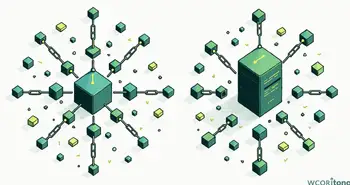Account Abstraction on Ethereum

Ethereum’s account system has always been split into two types: Externally Owned Accounts (EOAs) and smart contract accounts. EOAs, like your Metamask wallet, require private keys to sign transactions, and users must always hold ETH to pay gas fees. Smart contracts, on the other hand, can follow custom rules but cannot initiate transactions on their own.
This separation creates major usability and security issues. Losing a private key means losing all assets, gas fees must be paid in ETH, even if you only hold stablecoins, and wallets lack flexibility for automation or social recovery. Account abstraction (AA) changes this by allowing accounts to function like smart contracts, giving users more control, flexibility, and security.
With account abstraction, users can:
- Recover lost wallets through trusted contacts (social recovery).
- Pay gas fees in any token or even have fees sponsored.
- Automate transactions and set spending limits.
- Use multi-signature security without external smart contract wallets.
Ethereum has been working toward account abstraction for years, with multiple proposals and implementations. EIP-4337 is the leading solution, enabling account abstraction without protocol changes. It also introduces ERC-4337, a smart contract standard for building flexible smart wallets.
The Evolution of Account Abstraction on Ethereum
Ethereum’s original design required transactions to be signed by EOAs, which kept smart contracts dependent on EOAs for execution. Over time, developers recognized the limitations of this system and explored ways to enable smarter, more flexible wallets.
- EIP-86 (2016): One of the earliest proposals to merge EOAs and smart contracts. It was never fully adopted due to backward compatibility issues.
- EIP-86 (2018): The idea of smart contract wallets emerged, focusing on social recovery and on-chain fraud monitoring.
- EIP-2938 (2020): Aimed to add native AA at the protocol level but required major changes to Ethereum’s consensus rules.
- EIP-3074:Aimed to make existing EOAs act like smart contracts by allowing users to delegate wallet control to a smart contract. However, it didn’t achieve full account abstraction.
- EIP-4337 (2021-present): Instead of modifying Ethereum’s core protocol, this proposal introduces AA through a separate transaction processing system, making it the most practical approach.
EIP-4337 is now the dominant standard for account abstraction, enabling smart contract wallets to function like EOAs while maintaining Ethereum’s security and decentralization.
How Account Abstraction Works in Ethereum
At its core, account abstraction (AA) allows smart contract wallets to handle transactions independently, removing the reliance on an externally owned account (EOA). This unlocks a range of flexible and user-friendly features that EOAs cannot support, such as social recovery, automated transactions, and gas fee sponsorship.
But how does this work in practice? Instead of traditional Ethereum transactions, account abstraction introduces a new transaction system that operates through specialized components.

Key Components of Account Abstraction
Ethereum’s standard transaction model requires every transaction to be signed by an EOA and paid for with ETH. EIP-4337 introduces an alternative system, using UserOps instead of direct transactions. The key elements of this system include:
UserOperations
- In a traditional Ethereum transaction, a user directly signs and submits a transaction from an EOA. With account abstraction, users send UserOperations, a new type of request that contains transaction details, signature data, and gas fee payment instructions.
- These UserOperations are not sent directly to Ethereum’s regular mempool but instead enter a separate UserOps mempool for processing.
Bundlers
- Since smart contract wallets cannot submit transactions themselves, a special type of network participant, called a bundler, is responsible for collecting UserOperations.
- Bundlers group multiple UserOperations together and submit them as a single transaction to Ethereum’s blockchain.
- This process reduces network congestion and improves gas efficiency.
Paymasters
- Normally, Ethereum requires gas fees to be paid in ETH.
- Paymasters change this by allowing users to pay gas fees in ERC-20 tokens (such as USDC, DAI, or even a project’s native token).
- They can also sponsor gas fees, allowing dApps or companies to cover transaction costs for users, improving accessibility.
The EntryPoint Contract
- This is a special smart contract deployed on Ethereum that verifies and executes UserOperations.
- It ensures transactions are valid, signatures are checked, and gas fees are processed before execution.
- Every account abstraction wallet interacts with the EntryPoint contract to complete transactions securely.
Benefits of Account Abstraction
By replacing EOA-based transactions with this smart contract-driven system, Ethereum wallets become far more powerful, offering:
- No reliance on a single private key: Users can set up multi-signature security or biometric authentication instead of seed phrases.
- Gas fee flexibility: Pay gas fees in stablecoins or have them sponsored, removing the ETH dependency.
- Custom transaction logic: Automate spending limits, batch multiple actions into one transaction, or set up recurring payments.
- Improved security: Multi-factor authentication and social recovery reduce the risks of wallet hacks and lost keys.
By shifting transaction logic to smart contracts, Ethereum wallets become more user-friendly, secure, and accessible, a critical step toward mainstream adoption.

The Different Approaches to Account Abstraction in Ethereum
There are multiple ways Ethereum implements account abstraction, each with its own trade-offs.
EIP-4337: The Leading Smart Contract-Based AA Solution
- Works without modifying Ethereum’s core protocol.
- Uses a separate UserOperation mempool and bundlers to process transactions.
- Benefits: Decentralized, no hard forks required, supports multi-token gas payments.
- Challenges: Requires bundlers and paymasters to operate efficiently.
Layer 2 (L2) and Rollup-Based Account Abstraction
Many Layer 2 solutions (like Starknet, zkSync, and Optimism) integrate AA natively.
- L2s allow for cheaper gas fees and faster transactions, making AA more efficient.
- Example: Starknet already enables users to create smart contract wallets with built-in AA features.
Protocol-Level Account Abstraction: EIP-2938 and Beyond
- This approach would integrate AA into Ethereum’s consensus layer.
- Would make EOAs and smart contracts indistinguishable.
- Why it wasn’t adopted: Requires major changes to Ethereum’s core rules, which is difficult without a hard fork.
Smart Contract Wallets: The First Form of AA
Before EIP-4337, some wallets already mimicked AA using smart contracts.
- Safe (formerly Gnosis Safe), Argent, and Biconomy all enable social recovery, multi-signature security, and gas sponsorships.
- The downside? These solutions still rely on EOAs to sign transactions, making them less efficient than full AA.
While smart contract wallets were an early attempt, EIP-4337 and Layer 2 AA are the real future of account abstraction.
Use Cases: What Can You Do with Account Abstraction?
Account abstraction isn’t just a technical upgrade—it unlocks new possibilities for Ethereum users:
- Gasless Transactions: Users can pay gas fees with USDC, DAI, or even have them sponsored by a third party.
- Social Recovery: Instead of losing access when forgetting a seed phrase, users can recover wallets through trusted contacts.
- Session Keys: Users can approve transactions for a specific period (useful for gaming and DeFi interactions).
- Automated Transactions: Set up scheduled payments, auto-investments, or predefined trading strategies.
- Improved Security: Multi-signature transactions and spending limits reduce hacking risks.
These features bring Ethereum closer to traditional banking convenience, making it more appealing to mainstream users.
Final Thoughts
Account abstraction is one of Ethereum’s most exciting upgrades, bridging the gap between crypto and real-world usability. Whether through EIP-4337, Layer 2s, or protocol-level changes, it’s clear that smart contract wallets are the future of blockchain transactions. For users and developers alike, now is the time to start exploring the power of AA.
Want to experience gasless transactions, social recovery, and smart automation? Keep an eye on EIP-4337, because the Ethereum wallet experience is about to change forever.

Disclaimer: All investments involve risk, and the past performance of a security, industry, sector, market, financial product, trading strategy, or individual’s trading does not guarantee future results or returns. Investors are fully responsible for any investment decisions they make. Such decisions should be based solely on an evaluation of their financial circumstances, investment objectives, risk tolerance, and liquidity needs. This post does not constitute investment advice.

Painless trading for everyone
Hundreds of markets all in one place - Apple, Bitcoin, Gold, Watches, NFTs, Sneakers and so much more.

Painless trading for everyone
Hundreds of markets all in one place - Apple, Bitcoin, Gold, Watches, NFTs, Sneakers and so much more.









